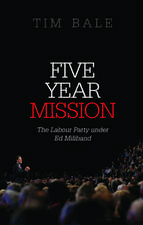Advancing Utopistics: The Three Component Parts and Errors of Marxism
Autor Mohammad H. Tamdgidien Limba Engleză Paperback – 30 sep 2009
| Toate formatele și edițiile | Preț | Express |
|---|---|---|
| Paperback (1) | 500.08 lei 6-8 săpt. | |
| Taylor & Francis – 30 sep 2009 | 500.08 lei 6-8 săpt. | |
| Hardback (1) | 1463.65 lei 6-8 săpt. | |
| Taylor & Francis – 15 feb 2007 | 1463.65 lei 6-8 săpt. |
Preț: 500.08 lei
Preț vechi: 588.34 lei
-15% Nou
Puncte Express: 750
Preț estimativ în valută:
95.70€ • 99.55$ • 79.01£
95.70€ • 99.55$ • 79.01£
Carte tipărită la comandă
Livrare economică 15-29 aprilie
Preluare comenzi: 021 569.72.76
Specificații
ISBN-13: 9781594513862
ISBN-10: 1594513864
Pagini: 336
Dimensiuni: 152 x 229 x 20 mm
Greutate: 0.44 kg
Ediția:1
Editura: Taylor & Francis
Colecția Routledge
Locul publicării:Oxford, United Kingdom
ISBN-10: 1594513864
Pagini: 336
Dimensiuni: 152 x 229 x 20 mm
Greutate: 0.44 kg
Ediția:1
Editura: Taylor & Francis
Colecția Routledge
Locul publicării:Oxford, United Kingdom
Recenzii
“In Tamdgidi's critical study of Marxism and its troubled relationship to utopianism, the pull between what is and what should be is re-explored creatively, resulting in a new and promising utopistics, shorn of limiting dualisms and conceits. An equally rigorous and hopeful book.”
—Avery F. Gordon,University of California at Santa Barbara
“Tamdgidi does the field of Marxist critique a great service in developing a more nonreductive dialectical method, laying bare self-defeating Eurocentric structures of thinking. Tamdgidi's suggestion—that utopistics must be a creative endeavor, to which all forms of knowledge and experience, Western and Eastern, scientific and otherwise, can and should critically contribute—is a major advance in the field of world-systems studies."
—Peter McLaren, Graduate School of Education and Information Studies,University of California at Los Angeles
“The argument of Dr. Tamdgidi’s book, that anti-utopianism in the form of radical materialism of the later Marx jeopardizes the creative dimension of dialectical thought, offers a critique and theoretical response rooted in the complex forces of the self as lived. The work is a contribution in Marxist social thought, in that it is a part of the stream that offers arguments for reconsidering the early Marx, but it is also a work in agency-oriented dialectical social thought.”
—Lewis R. Gordon, Laura H. Carnell Professor of Philosophy at Temple University and the Jay Newman Visiting Professor of Philosophy of Culture at Brooklyn College
“All of Professor Tamdgidi’s broad knowledge in world-history and East/West epistemologies are powerfully condensed in Advancing Utopistics. His book is a tour-de-force in several fields of scholarship such as world-systems, sociology of knowledge, and Marxist sociology, recasting both Mannheim’s and Wallerstein’s concept of utopia. Here he develops a radical critique of what he calls the three component parts and errors of Marxism … His recasting of the dialectical method beyond the binary of idealism vs. materialism is an original and crucial contribution to sociological theory.”
—Ramón Grosfoguel, Professor, Department of Ethnic Studies, University of California at Berkeley
—Avery F. Gordon,University of California at Santa Barbara
“Tamdgidi does the field of Marxist critique a great service in developing a more nonreductive dialectical method, laying bare self-defeating Eurocentric structures of thinking. Tamdgidi's suggestion—that utopistics must be a creative endeavor, to which all forms of knowledge and experience, Western and Eastern, scientific and otherwise, can and should critically contribute—is a major advance in the field of world-systems studies."
—Peter McLaren, Graduate School of Education and Information Studies,University of California at Los Angeles
“The argument of Dr. Tamdgidi’s book, that anti-utopianism in the form of radical materialism of the later Marx jeopardizes the creative dimension of dialectical thought, offers a critique and theoretical response rooted in the complex forces of the self as lived. The work is a contribution in Marxist social thought, in that it is a part of the stream that offers arguments for reconsidering the early Marx, but it is also a work in agency-oriented dialectical social thought.”
—Lewis R. Gordon, Laura H. Carnell Professor of Philosophy at Temple University and the Jay Newman Visiting Professor of Philosophy of Culture at Brooklyn College
“All of Professor Tamdgidi’s broad knowledge in world-history and East/West epistemologies are powerfully condensed in Advancing Utopistics. His book is a tour-de-force in several fields of scholarship such as world-systems, sociology of knowledge, and Marxist sociology, recasting both Mannheim’s and Wallerstein’s concept of utopia. Here he develops a radical critique of what he calls the three component parts and errors of Marxism … His recasting of the dialectical method beyond the binary of idealism vs. materialism is an original and crucial contribution to sociological theory.”
—Ramón Grosfoguel, Professor, Department of Ethnic Studies, University of California at Berkeley
Cuprins
Introduction; 1: Dictatorship of the “Proletariat”?; 2: Economically Inevitable Transition?; 3: Either Idealist or Materialist Dialectics?; 4: The Opposition of Idealist and Materialist Outlooks; 5: The Neither Idealist Nor Materialist Marx; 6: The Component Errors as a Whole; 7: Marxism and Utopia; Conclusion Toward Utopystics
Descriere
Mohammad H. Tamdgidi is Assistant Professor of Sociology at the University of Massachusetts Boston. He is the Founding Editor of Human Architecture:Journal of the Sociology of Self-Knowledge.










